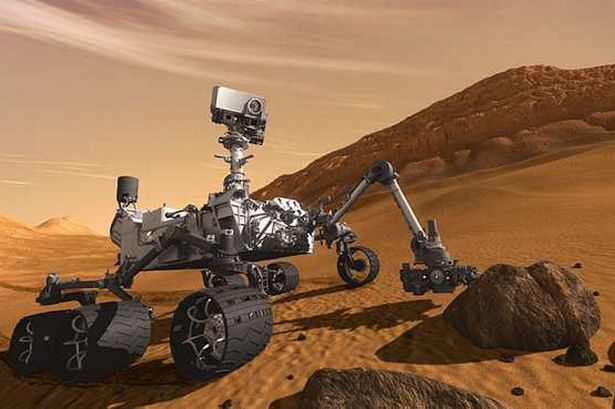Next week, India is set to launch a probe bound for Mars. It's a big moment for a country that has spent the last 50 years quietly tinkering away on space research while NASA and the European Space Agency have gotten all the glory. And it's a thumb in the eye of China, whose own Mars ambitions came apart in 2011 when technical issues forced Beijing to abandon its launch.
But even though India might benefit from beating China to the red planet, experts say gaining an edge back on Earth is the last thing scientists at ISRO, India's space agency, have on their minds. Unlike the space race of the Cold War, where getting to the moon first held important geopolitical ramifications, India's interest in space much like China's is very closely tied to its economic goals.
"To think that India's going to the moon and Mars because of some cynical ploy to engage in one-upsmanship with the Chinese is wrong," says John Sheldon, a national security analyst and founder of The Torridon Group, a strategy firm.
India's space program might be obscure to most, but millions of Indians are beneficiaries of it. Not in the American sense that it's produced fun inventions like Tang and Velcro, says Dean Cheng, a scholar at the Heritage Foundation. Instead, the country realized early on that satellites would enable health officials to practice medicine remotely, reaching inaccessible parts of the country. The same was true for remote education. ISRO's major focus, in other words, has been to use space research as a way to overcome the country's (still) steep economic obstacles.
"For every rupee invested," Sheldon adds, "there is a return for regular Indian people in terms of what that program provides."
Space exploration is a little bit different; it doesn't provide same direct economic benefits as building new imaging technologies or figuring out how to put something into geosynchronous orbit over Earth. Still, the tie-in to development is plainly clear: Countries that venture into outer space become part of an exclusive scientific club. Membership means being taken seriously in international circles. And that might be just as important for India's future as figuring out how to feed, shelter and clothe the next few hundred million people who'll be born there by 2050.
Even though politics might influence budgetary decisions about space policy, says Cheng, competition isn't a driving factor.
"When we look at top-tier Asian space powers," he says, "Japan, India, China all of these countries went into space for their own reasons. They did not go into space because somebody else went into space. ... Space is the dreadnought of the 21st century, or the automobile. You cannot make a claim about having moved beyond mid-level status unless you have a real space program."
And today, that means sending a mission to Mars.
India is going to Mars! But don?t call it a space race.
But even though India might benefit from beating China to the red planet, experts say gaining an edge back on Earth is the last thing scientists at ISRO, India's space agency, have on their minds. Unlike the space race of the Cold War, where getting to the moon first held important geopolitical ramifications, India's interest in space much like China's is very closely tied to its economic goals.
"To think that India's going to the moon and Mars because of some cynical ploy to engage in one-upsmanship with the Chinese is wrong," says John Sheldon, a national security analyst and founder of The Torridon Group, a strategy firm.
India's space program might be obscure to most, but millions of Indians are beneficiaries of it. Not in the American sense that it's produced fun inventions like Tang and Velcro, says Dean Cheng, a scholar at the Heritage Foundation. Instead, the country realized early on that satellites would enable health officials to practice medicine remotely, reaching inaccessible parts of the country. The same was true for remote education. ISRO's major focus, in other words, has been to use space research as a way to overcome the country's (still) steep economic obstacles.
"For every rupee invested," Sheldon adds, "there is a return for regular Indian people in terms of what that program provides."
Space exploration is a little bit different; it doesn't provide same direct economic benefits as building new imaging technologies or figuring out how to put something into geosynchronous orbit over Earth. Still, the tie-in to development is plainly clear: Countries that venture into outer space become part of an exclusive scientific club. Membership means being taken seriously in international circles. And that might be just as important for India's future as figuring out how to feed, shelter and clothe the next few hundred million people who'll be born there by 2050.
Even though politics might influence budgetary decisions about space policy, says Cheng, competition isn't a driving factor.
"When we look at top-tier Asian space powers," he says, "Japan, India, China all of these countries went into space for their own reasons. They did not go into space because somebody else went into space. ... Space is the dreadnought of the 21st century, or the automobile. You cannot make a claim about having moved beyond mid-level status unless you have a real space program."
And today, that means sending a mission to Mars.
India is going to Mars! But don?t call it a space race.

